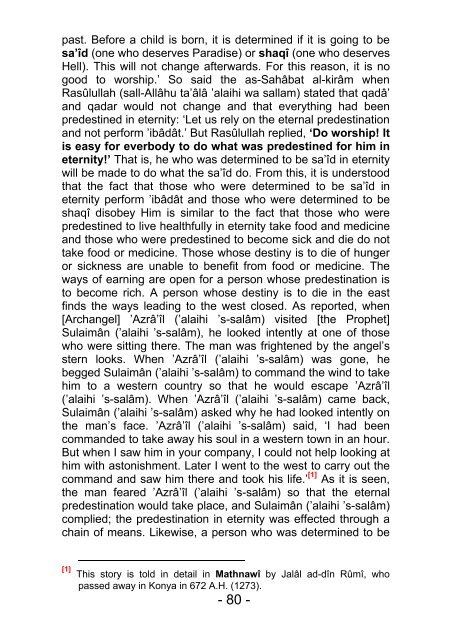8-Belief and Islam - Hakikat Kitabevi
8-Belief and Islam - Hakikat Kitabevi
8-Belief and Islam - Hakikat Kitabevi
You also want an ePaper? Increase the reach of your titles
YUMPU automatically turns print PDFs into web optimized ePapers that Google loves.
past. Before a child is born, it is determined if it is going to be<br />
sa’îd (one who deserves Paradise) or shaqî (one who deserves<br />
Hell). This will not change afterwards. For this reason, it is no<br />
good to worship.’ So said the as-Sahâbat al-kirâm when<br />
Rasûlullah (sall-Allâhu ta’âlâ ’alaihi wa sallam) stated that qadâ’<br />
<strong>and</strong> qadar would not change <strong>and</strong> that everything had been<br />
predestined in eternity: ‘Let us rely on the eternal predestination<br />
<strong>and</strong> not perform ’ibâdât.’ But Rasûlullah replied, ‘Do worship! It<br />
is easy for everbody to do what was predestined for him in<br />
eternity!’ That is, he who was determined to be sa’îd in eternity<br />
will be made to do what the sa’îd do. From this, it is understood<br />
that the fact that those who were determined to be sa’îd in<br />
eternity perform ’ibâdât <strong>and</strong> those who were determined to be<br />
shaqî disobey Him is similar to the fact that those who were<br />
predestined to live healthfully in eternity take food <strong>and</strong> medicine<br />
<strong>and</strong> those who were predestined to become sick <strong>and</strong> die do not<br />
take food or medicine. Those whose destiny is to die of hunger<br />
or sickness are unable to benefit from food or medicine. The<br />
ways of earning are open for a person whose predestination is<br />
to become rich. A person whose destiny is to die in the east<br />
finds the ways leading to the west closed. As reported, when<br />
[Archangel] ’Azrâ’îl (’alaihi ’s-salâm) visited [the Prophet]<br />
Sulaimân (’alaihi ’s-salâm), he looked intently at one of those<br />
who were sitting there. The man was frightened by the angel’s<br />
stern looks. When ’Azrâ’îl (’alaihi ’s-salâm) was gone, he<br />
begged Sulaimân (’alaihi ’s-salâm) to comm<strong>and</strong> the wind to take<br />
him to a western country so that he would escape ’Azrâ’îl<br />
(’alaihi ’s-salâm). When ’Azrâ’îl (’alaihi ’s-salâm) came back,<br />
Sulaimân (’alaihi ’s-salâm) asked why he had looked intently on<br />
the man’s face. ’Azrâ’îl (’alaihi ’s-salâm) said, ‘I had been<br />
comm<strong>and</strong>ed to take away his soul in a western town in an hour.<br />
But when I saw him in your company, I could not help looking at<br />
him with astonishment. Later I went to the west to carry out the<br />
comm<strong>and</strong> <strong>and</strong> saw him there <strong>and</strong> took his life.’ [1] As it is seen,<br />
the man feared ’Azrâ’îl (’alaihi ’s-salâm) so that the eternal<br />
predestination would take place, <strong>and</strong> Sulaimân (’alaihi ’s-salâm)<br />
complied; the predestination in eternity was effected through a<br />
chain of means. Likewise, a person who was determined to be<br />
[1] This story is told in detail in Mathnawî by Jalâl ad-dîn Rûmî, who<br />
passed away in Konya in 672 A.H. (1273).<br />
- 80 -











